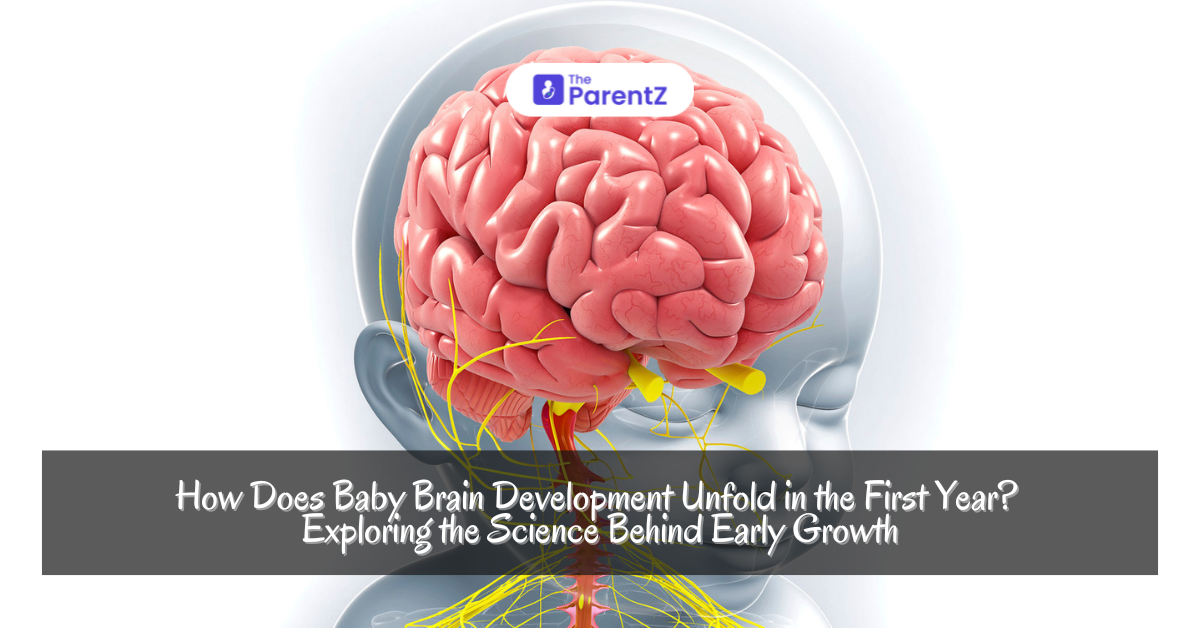The first year of a baby’s life is a period of remarkable brain development. During this time, a baby’s brain undergoes rapid growth and forms critical connections that lay the foundation for future learning and development. Understanding the science behind baby brain development can help parents and caregivers support this crucial phase. This article delves into the stages of brain development in the first year, the factors that influence growth, and practical ways to foster healthy brain development.
What Happens in Baby Brain Development During the First Year?
Stages of Brain Development
Birth to 3 Months
- Neural Connectivity: At birth, a baby’s brain contains about 100 billion neurons, but the connections between these neurons, known as synapses, are sparse. During the first three months, the brain starts forming these synapses rapidly.
- Sensory Processing: The brain begins to process sensory information. Babies start to recognize their parents’ voices, faces, and smells, which are critical for bonding and emotional development.
3 to 6 Months
- Increased Synaptic Density: Synapse formation continues at a rapid pace, reaching a peak that is twice as dense as that of an adult brain.
- Motor Skills Development: The brain areas responsible for motor skills become more active. Babies start to gain control over their movements, learning to roll over, grasp objects, and bring their hands to their mouths.
6 to 12 Months
- Cognitive Development: Babies begin to understand cause and effect, develop object permanence, and show early problem-solving skills.
- Language Acquisition: The brain areas involved in language start to develop. Babies babble, imitate sounds, and begin to understand basic words and phrases.
What Factors Influence Brain Development in the First Year?
Genetics and Biology
Genetic Blueprint
A baby’s genetic makeup plays a crucial role in brain development. Genes provide the basic blueprint for brain structure and function, influencing aspects such as neural connectivity and susceptibility to certain conditions.
Biological Processes
Biological processes like neurogenesis (the formation of new neurons) and myelination (the development of the myelin sheath around neurons) are critical for efficient brain function. Myelination helps speed up the transmission of neural signals, aiding in faster processing of information.
Environmental Influences
Nutrition
Proper nutrition is essential for brain development. Nutrients such as DHA (a type of omega-3 fatty acid), iron, and choline are vital for cognitive development and neural function. Breast milk or formula provides the necessary nutrients for a baby’s growing brain.
Sensory Stimulation
Sensory experiences are fundamental for brain development. Exposure to a variety of sights, sounds, and textures helps form new neural connections. Interactive play, reading, and talking to your baby stimulate cognitive and language development.
Emotional and Social Interactions
Responsive caregiving and secure attachment are crucial for healthy brain development. Positive interactions, such as cuddling, talking, and playing, provide the emotional security needed for optimal growth. Stress and neglect, on the other hand, can negatively impact brain development.
How Can Parents Support Healthy Brain Development?
Provide a Stimulating Environment
Engage in Interactive Play
Interactive play promotes cognitive, motor, and social development. Activities such as peek-a-boo, singing, and using age-appropriate toys encourage exploration and learning.
Read to Your Baby
Reading to your baby from an early age supports language development and cognitive skills. Choose books with bright colors, simple text, and engaging pictures to capture your baby’s interest.
Ensure Proper Nutrition
Breastfeeding and Formula
Breastfeeding is recommended as it provides optimal nutrition and antibodies. If breastfeeding is not possible, ensure that the formula is enriched with essential nutrients like DHA and iron.
Introduce Solid Foods
Around six months, start introducing a variety of nutrient-rich solid foods. Include foods that are rich in iron and other essential nutrients to support brain development.
Foster Emotional Security
Responsive Caregiving
Respond promptly to your baby’s needs to build a secure attachment. Comforting your baby when they cry, engaging in eye contact, and showing affection help build trust and emotional security.
Create a Safe and Loving Environment
Ensure that your baby feels safe and loved. Consistent routines, a calm environment, and positive interactions contribute to a secure and nurturing atmosphere.
What Are Common Myths About Baby Brain Development?
Myth: Baby Brain Development is Predetermined
While genetics play a role, the environment significantly influences brain development. Early experiences and interactions shape the brain’s architecture and function.
Myth: Babies Need Structured Learning for Brain Development
Unstructured play and natural interactions are more beneficial for brain development than structured learning. Babies learn best through exploration and responsive caregiving.
Myth: More Stimulation is Always Better
While stimulation is important, overstimulation can be counterproductive. Balance active play with quiet time to avoid overwhelming your baby.
Conclusion
The first year of a baby’s life is a period of extraordinary brain development, influenced by a combination of genetic and environmental factors. By understanding the stages of brain development and the factors that influence it, parents can provide the necessary support to foster healthy growth. Creating a stimulating, nurturing, and responsive environment will help ensure that your baby’s brain develops optimally, laying the foundation for future learning and development.








Be the first one to comment on this story.